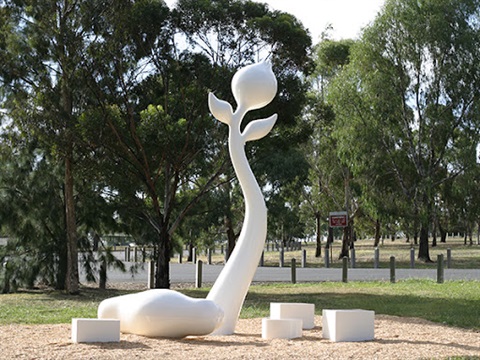Permanent Public Art Collection

Darebin's collection of permanent public artworks
Darebin has 30 public artworks in its permanent collection including sculptures, mosaics, murals and installation. Included below are a selection of these works.
“Three Follies”
by Bush Projects, 2014

“Three Follies” reconnects residents to the isolated island oasis of Ray Bramham Gardens by providing an interactive and playable work which honours the botanical theme of the park while subtly referencing the site’s industrial history. The artwork is a series of sunken, suburban garden follies, located at three key points within the space. A sunken arch appears as an architectural ruin suggestive of an old kiln, a brick hedge mimics the shape of a parterre garden and a stage forms a raised viewing platform to admire the pond.
Location: Ray Bramham Gardens
St Georges Road Koori Mural
By Megan Evans, Les Griggs, Ian Johnson, Eleain Trott, Ray Thomas and Millie Yarran

This iconic Mural suffered significant weather damage and material deterioration over the past three decades of being exposed to the elements but has recently been lovingly restored. The mural was designed by Megan Evans in consultation with a committee from the Aborigines Advancement League consisting of the late Lin Onus, the late Molly Dyer, the late Ron Johnson, the late Elizabeth Hoffman and was painted by renowned Aboriginal artists Ray Thomas, Ian Johnson, Millie Yarram, Les Griggs, Elaine Trott and Megan Evans with the help of many other volunteers.
Location: St Georges Road, Thornbury
Watch the video about the Koori Mural restoration, Koori Mural TOM, from Ged Hart on Vimeo.
The Nest
By David Bell and Gary Tippett

The symbolic egg form at the heart of this design echoes the hope for recovery and new life, and for the rebirth of the land. The piece also references the conservation role of the park and in particular the role this park plays for the many birds that live and nest within.
Location: Darebin Parklands, Fairfield
The Connection
By Michael Snape.

The Connection depicts many people coming together in an animated, alive way, the separate components becoming one. It refers to the meaningful links between different groups in the community and the connections which contribute to harmony in Darebin.
Location: Preston Civic Forecourt, High Street, Preston
Source
By Adrian Mauriks

The work relates to the themes the “Present” and “Future” with an emphasis on the natural environment. The colour and the reclining form, which appears embryonic, bring to mind birth and new beginnings and the bud, the flowering of life.
Location: Bundoora Park entrance, Bundoora
Fairfield Industrial Dog Object (FIDO)
By Alistair Knox, Ian Sinclair, Jacki Staude and David Davies.

Through the use of sensors and digital controls, FIDO talks to passers by, wags its tail, wiggles its ears and lights up at night.
The materials used, the form and the interactive nature of this monumental work were chosen specifically to respond to the friendliness and vitality of Fairfield Village and enhance the sense of community for this dog-loving precinct.
Location: Fairfield
Untitled 8/73
By Reg Parker

The sculpture is an example of a classic formalist work by one of the early practitioners of the style in Australia. It is probably the earliest abstract sculpture in a public place in the northern region of Melbourne. The work is also socially significant as an example of government-funded visual arts policy of the Whitlam era, which had the expressed intention of placing contemporary Australian art in communities which were overlooked in the past.
Location: Preston Library, Preston